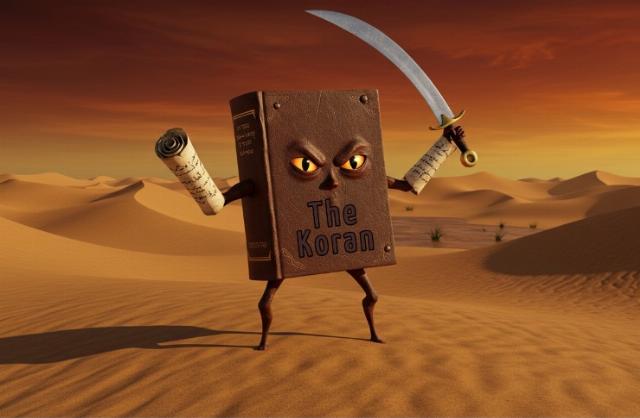


A database search of 12 million books published in the 300 years before 9/11 reveals only one instance of the phrase “Islam is a religion of peace.” It appears in fiction and is spoken by Ayatollah Mahmoud Haji Daryaei, an Iranian leader in Tom Clancy’s thriller Executive Orders.
But the dangerous notion that Islam is peaceful has been so frequently reiterated by world leaders, clerics, and the liberal media-academia complex that it has taken on the status of COWDUNG—a facetious near-acronym for ‘conventional wisdom of the dominant group.’
Denying 1,400 years of history, these apologists would have us believe that extremist Islam is a perversion. Their sanitized version presents Islam’s prime motif of violent jihad—or religious war against infidels—as an individual’s “inner struggle” for spiritual growth.

Image created using AI.
To expose these falsehoods—which have circled the globe before the truth even got out of bed—conservative authors Tommy Robinson and Peter McLoughlin wrote Mohammed’s Koran: Why Muslims Kill for Islam. First published in 2017, the bestselling book saw a second edition and faced an Amazon ban in 2019. (Adolf Hitler’s Mein Kampf and many terror manuals remain available.)
In light of Robinson’s early release from a British prison a few days ago, an overview of this important book seems fitting. The authors assert that the key to understanding what the Koran signifies to Muslims is naskh, an interpretive guideline indicating that in the Koran, what comes after negates what precedes it. Later verses remain valid even if they contradict earlier ones.
By presenting the Koran in reverse chronological order, the authors allow us to see how quotes on peace and the absence of compulsion in religion that Islam’s apologists cherry-pick hold little significance because they precede more violent dictates. The authors utilize a widely popular 1930 translation of the Koran by Muhammad Marmaduke Pickthall, a British convert to Islam, while shedding light on a deception it created. More on that later.
Their 101-page introduction outlines the history of Mohammed’s religion and its misrepresentation after 9/11. It mentions that in the 19th and 20th centuries, authors as diverse as Winston Churchill and Samuel Huntington could openly criticize Islam as frenzied and violent. British Prime Minister William Gladstone (1809-98) proclaimed that “So long as there is this book, there will be no peace in the world.”
The authors indicate that there were two phases in the Prophet’s life, each corresponding to different sections of the Koran. In the first phase, Mohammed lived in Mecca with a few followers and no power; the related section is benevolent and peaceful. In the second phase, following the Hijra to Medina, he emerged as a powerful warlord focused on conquest; the Koranic section for this phase is overtly violent and abrogates what is stated in the first.
During the first phase, survival required Mohammed to foster good relations with the Meccan tribes. Therefore, he preached tolerance, presented himself as peaceful, and refrained from discussing jihad. However, respect for other religions faded once he gained power. He executed defeated tribes and demanded either conversion or submission to Islam.
The oft-quoted ayat as-sayf—or Verse of the Sword (Koran 9:5) from the chapter titled Surat at-Tawbah—which sanctions the massacre of infidels, comes from the latter phase of Mohammed’s life. It abrogates 120 earlier ayats, including Koran 2:256, which speaks of “no compulsion in religion.” To Muslims, Mohammed’s later words represent the unchanging word of Allah. The authors’ reverse presentation exposes the deception of apologist quote masters.
Mohammed’s religion expanded only after he integrated robbery and killing into it. Thus, war and plunder are intrinsic to Islam. The authors state that “strive in Allah’s way” always refers to jihad, and “gardens” to Paradise, the reward for jihadis. Those words inspire today’s terrorists as much as they did medieval warriors.
Unlike Buddhism or Christianity, whose founders advocated love and peace, Islam has often been linked to bloodshed and subjugation. As a result, after 9/11, it became crucial for Islam to present a gentler image to the world, which still struggles to connect with a religion tied to violence by a warlord. Many world leaders became unwitting accomplices in this deception.
To prevent reckless attacks on large Muslim communities within their borders and to appear fair while pursuing Al-Qaeda in Afghanistan and Pakistan, Western leaders such as George W. Bush, Jacques Chirac, and Tony Blair began to express platitudes about Islam being inherently peaceful. Shortly thereafter, religious leaders joined this initiative. Islamists allied with left-leaning figures in the media and academia to weaken Westerners’ resistance to Islam.
The authors note how post-9/11 academic works relied on a deception that had been practiced from the mid-19th century to the early 20th century. Before World War II, the available translations of the Koran, some by non-Muslims, were chronological and reflected the true intent of Islam.
The most popular was one by James Medows Rodwell. Flipping through its pages, one might think the chapter numbers are hopelessly jumbled. However, it follows a chronological order, concluding with the most violent chapters, 9 and 5. Robinson and McLoughlin argue that anyone reading the Koran in English during that time would have understood that the peaceful verses were annulled and that, toward the end of his life, Mohammed was calling for “genocide and apartheid.”
But by the 1950s, with the increase of Muslim immigrants to the West, the Rodwell translation was “crowded out” by the Pickthall version, which is not only turgid but also obscures the intent with a neat yet misleading chapter numbering. The chapters themselves follow the non-chronological, traditional presentation, written a few years after Mohammed’s death and based on recitations by those who had reportedly memorized the previously unwritten revelations.
Many of these memorizers, the fiercest warriors of Islam, were dying in battle. Fearing that the revelations might be lost, early Muslims recorded various recitations. This resulted in many versions, which were ultimately unified into one in Arabic that is now accepted as the final word.
The authors claim that the Pickthall translation lacks the necessary information “to make sense of the illogical ordering of the chapters.” They contend that its publication in an Everyman’s Library edition, which replaced the Rodwell version, was part of a “wider movement of the educated elite submitting to Muslim demands to frame Islam” to accommodate Islamic supremacists.
They say that, nevertheless, the elite, had they been careful readers, could not have missed Islam’s belligerence. Introductions to both translations note the fearsome early wars to establish a Caliphate. The authors suggest that the publication of several confusing, chronology-concealing translations from the 1990s onward was deliberate. This “thicket of misleading Koran translations provided the background” against which “the Grand Lie” that Islam is peaceful flourished.
After 9/11, self-proclaimed moderate Muslim leaders—some of whom had visited the White House, advised the Pentagon, and lectured FBI cadets on a peaceful Islam—continued to inform Muslims living in the U.S. that their ultimate goal was to transform America into an Islamic state. Their moderation and patriotism were merely a façade for conquest.
Robinson and McLoughlin’s book contains all the background needed to see past the Grand Lie and understand that a) Muslims are to remain in perpetual jihad until the world is converted or subjugated; b) they are to besiege, enslave, or kill non-Muslims; c) they are not to make friends with Jews or Christians; d) they are to wage war even if they find it hateful; and e) they may deceive infidels without fear of sin.
The authors write: “Muslims around the world must laugh at the freedom-loving, democracy-loving West, where our elected leaders can lie to us blatantly about the doctrines and history of Islam.” Their book—a bold attempt to stop the lying—is a must-read for the free world.
